High myopia, also known as pathological myopia, is a condition where the eye grows too long, causing light to focus in front of the retina instead of on it. This can lead to severe vision problems and an increased risk of eye-related complications. In this article, we will explore the causes, symptoms, and treatment options for high myopia.
What Causes High Myopia?
High myopia is believed to be caused by a combination of genetic and environmental factors. Some of the known risk factors for high myopia include:
- Family history of high myopia
- Excessive reading or close work
- Lack of outdoor activity
- Poor nutrition
While these factors can increase the risk of developing high myopia, the exact cause of the condition is not fully understood.
Symptoms of High Myopia
The symptoms of high myopia can vary from person to person, but typically include:
- Blurred vision, especially at a distance
- Difficulty seeing in low light conditions
- Squinting or tilting the head to see better
- Eye strain or fatigue
- Headaches
In some cases, high myopia can also lead to more serious complications such as retinal detachment, cataracts, and glaucoma.
Diagnosis of High Myopia
High myopia can be diagnosed through a comprehensive eye exam, which may include:
- Visual acuity test: Measures how well you can see at different distances.
- Refraction test: Determines the exact prescription needed to correct your vision.
- Dilated eye exam: Allows the eye doctor to examine the inside of your eye for signs of disease or other issues.
- Optical coherence tomography (OCT): Uses light waves to create detailed images of the retina and other structures inside the eye.
Treatment Options for High Myopia
There are several treatment options available for high myopia, depending on the severity of the condition and the individual's needs. Some common options include:
- Eyeglasses or contact lenses: Prescription lenses can help to correct the refractive error and improve vision.
- Orthokeratology: Special contact lenses are worn overnight to temporarily reshape the cornea and improve vision during the day.
- Refractive surgery: In some cases, refractive surgery such as LASIK or PRK may be recommended to correct the refractive error and improve vision.
Tips for Managing High Myopia
In addition to the treatment options listed above, there are several tips that can help to manage symptoms and reduce the risk of complications associated with high myopia:
- Take breaks: If you spend a lot of time reading or using a computer, take frequent breaks to rest your eyes and reduce eye strain.
- Increase lighting: Adequate lighting can help to reduce eye strain and improve vision.
- Wear protective eyewear: If you play sports or engage in other activities that can cause eye injury, wear protective eyewear to reduce the risk of complications.
- Maintain regular eye exams: Regular eye exams can help to monitor changes in your vision and ensure that your prescription is up-to-date.
Conclusion
High myopia is a serious condition that can lead to severe vision problems and an increased risk of eye-related complications. While it cannot be cured, there are several treatment options available to improve vision and reduce the risk of complications. By working with an eye doctor and following these tips for managing high myopia, you can maintain clear vision and reduce the risk of complications.
FAQs
- Can high myopia be prevented?
- While there is no guaranteed way to prevent high myopia, maintaining a healthy lifestyle and getting regular eye exams can help to reduce the risk of developing the condition.
- Is high myopia hereditary?
- High myopia is believed to have a genetic component, and individuals with a family history of the condition may be at a higher risk of developing it.
- What are the risks of untreated high myopia?
- Untreated high myopia can lead to severe vision problems and an increased risk of complications such as retinal detachment, cataracts, and glaucoma.
- Can high myopia be corrected with surgery?
- In some cases, refractive surgery such as LASIK or PRK may be recommended to correct the refractive error and improve vision.
- How often should I have my eyes examined if I have high myopia?
- It is important to maintain regular eye exams to monitor changes in your vision and ensure that your prescription is up-to-date. Your eye doctor can recommend an appropriate schedule based on your individual needs.








